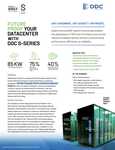The European Commission has opened an in-depth investigation into the proposed acquisition of chip designer Arm by Nvidia under EU Merger Regulation.
The acquisition, first proposed in September 2020, is also being investigated by regulators in the UK, US, and China.
“Semiconductors are everywhere in products and devices that we use every day as well as in infrastructure such as data centers," executive vice-president of the EC Margrethe Vestager, said.
"Whilst Arm and Nvidia do not directly compete, Arm's IP is an important input in products competing with those of Nvidia for example in data centers, automotive, and in the Internet of Things.
"Our analysis shows that the acquisition of Arm by Nvidia could lead to restricted or degraded access to Arm's IP, with distortive effects in many markets where semiconductors are used. Our investigation aims to ensure that companies active in Europe continue having effective access to the technology that is necessary to produce state-of-the-art semiconductor products at competitive prices.”
Arm acts as a vendor-neutral licensor, selling its chip designs and architectures to a number of companies, Nvidia included. "The merged entity would also have the economic incentive to engage in such foreclosure strategies which could reduce competition in the market for the supply of processor products across different fields of application," the EC said.
The Commission will also examine whether licensees will be reluctant to continue sharing commercially sensitive information with a company controlled by Nvidia.
Another area of concern is whether Arm's R&D spending will be refocused on products that are more profitable to Nvidia.
The Commission now has 90 working days, until 15 March 2022 to take a decision.
In August, the UK's Competition and Markets Authority said that it "found significant competition concerns associated with the merged business’ ability and incentive to harm the competitiveness of Nvidia's rivals," potentially by restricting access to Arm IP and "impairing interoperability between related products, so as to benefit Nvidia's downstream activities and increase its profits."
Chinese regulators also risk holding up the acquisition, while the US FTC has opened an investigation into the acquisition after Google, Microsoft, and Qualcomm complained it would limit competition.




